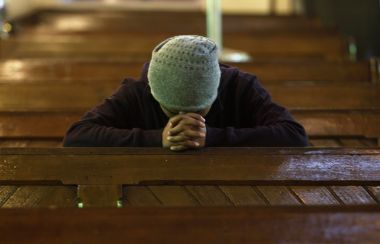The power of the Woman Who Prays

I'm an early riser, increasingly useless after about noon, but sharpest first thing in the morning. That's why I often find myself out for an early morning walk, and that's why I often see the Woman Who Prays.
She's always in the same place, at the same time. From 6am – and who knows, maybe earlier – walking around the front yard of a small Baptist chapel. As she walks, she quietly prays – turning in endless circles around what's an almost comically tiny area. She smiles at passers-by; I guess she probably prays for them too. Most of them look at her strangely, as if she must be mentally ill. I think I know the reality though. She's not committable, she's merely committed.
I've passed that chapel in the early morning on countless occasions: in driving rain and on holiday days, when the sun rises early, and when the long night keeps her mainly hidden. The Woman Who Prays is always there, every day, saying her prayers; crying out to God for her community and for who knows what else. Maybe she's been praying for me, the man who always offers her an embarrassed half-smile of encouragement (which she may well perceive as mild threat).
If I'm honest, the Woman Who Prays causes me to reflect on my own prayer life, and unsurprisingly I don't measure up too well. She gets up, gets dressed, and gets out every morning before six, not just to pray, but to pray in a particular place – and presumably for a particular reason. I on the other hand, might sometimes mutter a few words of thanks – and considerably more of petition – as I hurry along the street at that time, almost certainly late for a train. She's there every single day; I can't seem to form a prayer habit that lasts more than a week. And while I might counsel myself that grace makes everything ok, I'm not sure that's quite good enough.
What the Woman has grasped much better than me is the importance of persistent prayer, and the need to develop a discipline around that. Perhaps if she didn't get up and come to the chapel, life might get in the way. She knows, however, that her prayers are important – that she's on a mission, and it demands self-discipline from her.
In the Gospel of Luke (18:1-8), Jesus tells a parable about a woman who won't take no for an answer. She's a widow, and she's been wronged; we don't know much more than that. She asks the judge for justice, and he refuses to help, so she comes to him, over and over and over again with the same plea. She wears him down with her persistence; eventually he agrees to help. While this judge is deeply flawed (and called 'unjust' by Jesus), he's meant in some way to illustrate how God responds to that kind of persistent petitioning. All prayer is good, but it seems like there's value in campaigning for an answer, or at least, for justice.
This reminds me of the story of the 1949 Hebridean revival. It started when two elderly women began to pray for their island parish, morning and night, in the back room of a small cottage. They'd get on their knees – aged 84 and 82 – at 10pm and remain there, praying, until 3 or 4 o'clock in the morning. They cried out, just like that persistent widow, for the young people of their parish, who had completely deserted the churches. Both of them were elderly, one of them was totally blind; they would have been considered entirely unremarkable in their church and community. And three years later, the entire island had become passionate followers of Jesus (You can read a transcript of revivalist Duncan Campbell's description of these events here).
Perhaps those Women Who Prayed inspire the Woman Who Prays too. And all of them inspire me, because frankly, they all display the kind of faith and commitment that I want, but that I don't currently exhibit.
Each time I walk past the Woman now, I'm jolted into prayer. She's achieving a lot more than that, I'm sure, but she's also inspiring me to develop self-discipline around prayer. God rewards persistence, perhaps because it demonstrates that we're serious about what we're asking, and that we actually have faith that he could answer (see v8 of that parable). The Woman Who Prays gets that more than most, and surely sees her prayers answered powerfully. Imagine how the world might change if people like her weren't quite so rare.
Martin Saunders is a Contributing Editor for Christian Today and an author, screenwriter and the Deputy CEO of Youthscape. Follow him on Twitter: @martinsaunders











